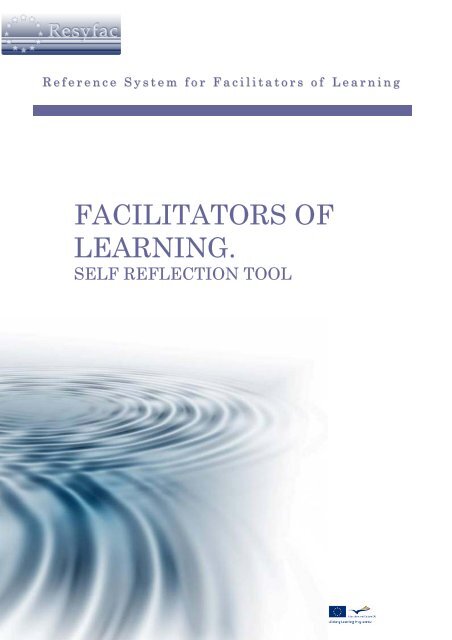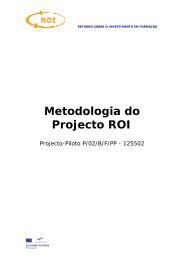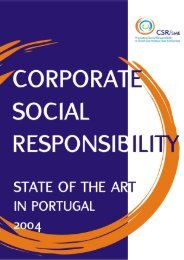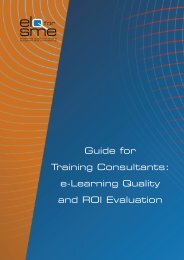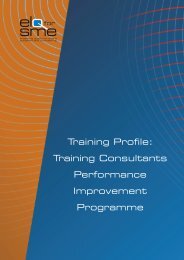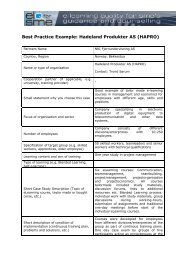Facilitators of Learning. Self Reflection tool. - Cecoa
Facilitators of Learning. Self Reflection tool. - Cecoa
Facilitators of Learning. Self Reflection tool. - Cecoa
You also want an ePaper? Increase the reach of your titles
YUMPU automatically turns print PDFs into web optimized ePapers that Google loves.
R e f e r e n c e S y s t e m f o r F a c i l i t a t o r s o f L e a r n i n g<br />
FACILITATORS OF<br />
LEARNING.<br />
SELF REFLECTION TOOL
R e f e r e n c e S y s t e m f o r F a c i l i t a t o r s o f L e a r n i n g<br />
Project:<br />
Leonardo da Vinci, Reference System for <strong>Facilitators</strong> <strong>of</strong> <strong>Learning</strong>, Grant<br />
Agreement Number: 134049-LLP-2007-PT-LMP<br />
http://www.facilitationsystem.eu/<br />
Title:<br />
“<strong>Facilitators</strong> <strong>of</strong> <strong>Learning</strong> – <strong>Self</strong> <strong>Reflection</strong> Tool”<br />
Editor<br />
MMS – Maltese Mentoring Society, Malta<br />
Authors: John Abela, Mariela Azzopardi, Margaret Attard, David Calleja Urry, Paul Dalli and<br />
Joe Montebello<br />
Place <strong>of</strong> Edition:<br />
Date <strong>of</strong> Edition<br />
Malta November 2009<br />
RESYFAC – Reference System for <strong>Facilitators</strong> <strong>of</strong> <strong>Learning</strong><br />
Grant Agreement Number: 2007-1977/001-001<br />
2
R e f e r e n c e S y s t e m f o r F a c i l i t a t o r s o f L e a r n i n g<br />
TABLE OF CONTENTS<br />
Preface………………………………………………………………………….…..4<br />
1. Introduction – What makes a Facilitator <strong>of</strong> <strong>Learning</strong>? ……….………6<br />
2.1 Reviewing the Activities and Tasks <strong>of</strong> a Facilitator <strong>of</strong> <strong>Learning</strong>..…....7<br />
• Task pr<strong>of</strong>ile 1: Facilitating general learning/ individual learning<br />
development<br />
• Task pr<strong>of</strong>ile 2: Organisational development<br />
• Task pr<strong>of</strong>ile 3: Focusing on performance/ economic indicators<br />
• Task pr<strong>of</strong>ile 4: Specific needs/problem solution<br />
2.2 Reviewing the Knowledge, Skills and Competencies Pr<strong>of</strong>ile <strong>of</strong> a<br />
Facilitator <strong>of</strong> <strong>Learning</strong>………………………………………………………11<br />
RESYFAC – Reference System for <strong>Facilitators</strong> <strong>of</strong> <strong>Learning</strong><br />
Grant Agreement Number: 2007-1977/001-001<br />
3
R e f e r e n c e S y s t e m f o r F a c i l i t a t o r s o f L e a r n i n g<br />
PREFACE<br />
This <strong>tool</strong> has been based on the research done in the project’s Work package 2 and published the<br />
“<strong>Facilitators</strong> <strong>of</strong> <strong>Learning</strong>: <strong>Self</strong> <strong>Reflection</strong> Tool” is based on the research done in the project Work<br />
package 2 as published under “<strong>Facilitators</strong> <strong>of</strong> <strong>Learning</strong> – Framework and Pr<strong>of</strong>iles Throughout<br />
Europe” and the “<strong>Facilitators</strong> <strong>of</strong> <strong>Learning</strong>: European Dossier <strong>of</strong> Commonalities”. Both <strong>of</strong> these<br />
documents are the results and two <strong>of</strong> the main products <strong>of</strong> the RESYFAC – Reference System<br />
for <strong>Facilitators</strong> <strong>of</strong> <strong>Learning</strong>* (*The Facilitator <strong>of</strong> <strong>Learning</strong> being understood as the “one who<br />
promotes the acquisition <strong>of</strong> knowledge and skills by establishing a favourable learning<br />
environment, including anyone exercising a teaching, training, supervision and guidance<br />
function. The Facilitator helps the learner develop knowledge and skills by providing guidelines,<br />
feedback and advice throughout the learning process) – project that was developed under the<br />
Lifelong <strong>Learning</strong> programme, Leonardo da Vinci sub-programme, from 2007 to 2009. These<br />
documents were based on the results <strong>of</strong> an extensive research in 28 European countries (see<br />
results on web link: www.facilitationsystem.eu) - provides basic features <strong>of</strong> zones <strong>of</strong> mutual trust<br />
supporting the occupational pr<strong>of</strong>ile <strong>of</strong> a facilitator <strong>of</strong> learning, seen from the transnational<br />
European perspective.<br />
This <strong>Self</strong> <strong>Reflection</strong> Tool follows a series <strong>of</strong> activities consisting <strong>of</strong> workshops interviews and<br />
meetings between training providers and training recipients, where questions stimulating selfreflection<br />
<strong>of</strong> facilitators <strong>of</strong> learning were developed and discussed. The Pr<strong>of</strong>iles summarised in<br />
the “<strong>Facilitators</strong> <strong>of</strong> <strong>Learning</strong> Dossier <strong>of</strong> Commonalities” 1 worked as a framework and guideline<br />
for the workshops and interviews. Four separate half-day workshops were held. <strong>Facilitators</strong> <strong>of</strong><br />
<strong>Learning</strong> attended two <strong>of</strong> these workshops, and training providers attended one workshop whilst<br />
facilitators, training providers and training recipients together, attended the final workshop.<br />
The number <strong>of</strong> participants <strong>of</strong> each workshop was restricted to six persons. Two different<br />
Mentors from the Maltese Mentoring Society conducted the workshops and two others were<br />
appointed to report all the discussions and conclusions reached during these workshops.<br />
Furthermore, ten facilitators were interviewed individually.<br />
1<br />
See “<strong>Facilitators</strong> <strong>of</strong> <strong>Learning</strong>: European Dossier <strong>of</strong> Commonalities”, chapter 6<br />
RESYFAC – Reference System for <strong>Facilitators</strong> <strong>of</strong> <strong>Learning</strong><br />
Grant Agreement Number: 2007-1977/001-001<br />
4
R e f e r e n c e S y s t e m f o r F a c i l i t a t o r s o f L e a r n i n g<br />
Four meetings were held between the authors <strong>of</strong> this document in order to review and compile<br />
the results <strong>of</strong> the workshops and interviews. This document was drawn after having reviewed<br />
all the material collected and after having considered the brief <strong>of</strong> presenting a short and concise<br />
document, which may be useful as a self-reflection <strong>tool</strong>, easy to understand and to handle.<br />
This self-reflection <strong>tool</strong> is being directed towards internal and external trainers considered as<br />
facilitators <strong>of</strong> learning as defined earlier on.<br />
The <strong>tool</strong> provides criteria, which should be met by a facilitator <strong>of</strong> learning. It aims at stimulating<br />
the facilitators to improve their knowledge, skills, and competences basis as well as their<br />
performance <strong>of</strong> facilitating learning processes continuously.<br />
It may serve as a self-reflection checklist before embarking on a facilitating <strong>of</strong> learning process.<br />
RESYFAC – Reference System for <strong>Facilitators</strong> <strong>of</strong> <strong>Learning</strong><br />
Grant Agreement Number: 2007-1977/001-001<br />
5
R e f e r e n c e S y s t e m f o r F a c i l i t a t o r s o f L e a r n i n g<br />
1. Introduction -<br />
What makes a Facilitator <strong>of</strong> <strong>Learning</strong>?<br />
The Facilitator <strong>of</strong> <strong>Learning</strong> being understood as the “one who promotes the acquisition <strong>of</strong><br />
knowledge and skills by establishing a favourable learning environment, including anyone<br />
exercising a teaching, training, supervision and guidance function. The Facilitator helps the<br />
learner develop knowledge and skills by providing guidelines, feedback and advice throughout<br />
the learning process.” (See ReSyFac Glossary)<br />
Many think that they can easily play the role <strong>of</strong> a facilitator <strong>of</strong> learning. However there are<br />
certain activities, tasks and KSC (knowledge, skills and competences) that clearly distinguish a<br />
facilitator <strong>of</strong> learning from other pr<strong>of</strong>essionals.<br />
The self-reflection <strong>tool</strong> stating the kind <strong>of</strong> activities/tasks an individual must develop and related<br />
skills he/she must have within a facilitation process, can help pr<strong>of</strong>essionals to be more aware <strong>of</strong><br />
their role in order to be effective as facilitators <strong>of</strong> learning.<br />
However, one size does not fit all. Personal sensitivity and commitment depend on the individual<br />
personal experience. Nevertheless, awareness can improve everyone’s performance as facilitators<br />
<strong>of</strong> learning, and awareness can improve everyone's skills.<br />
RESYFAC – Reference System for <strong>Facilitators</strong> <strong>of</strong> <strong>Learning</strong><br />
Grant Agreement Number: 2007-1977/001-001<br />
6
R e f e r e n c e S y s t e m f o r F a c i l i t a t o r s o f L e a r n i n g<br />
2.1 Reviewing the Activities and Tasks <strong>of</strong> a<br />
Facilitator <strong>of</strong> <strong>Learning</strong><br />
The tasks <strong>of</strong> a facilitator <strong>of</strong> learning comprehend a lot <strong>of</strong> activities and duties which can be<br />
related to three phases in each facilitation process:<br />
• preparing the learning process<br />
• conducting the learning process<br />
• evaluating the learning process.<br />
Moreover there can be defined 4 different task pr<strong>of</strong>iles with regard to the context <strong>of</strong> facilitation<br />
<strong>of</strong> learning within the enterprise:<br />
Dependent on the task pr<strong>of</strong>ile the three phases <strong>of</strong> facilitation <strong>of</strong> learning may require different<br />
tasks. Thus the self-reflection questions are formulated with regard to the 4 task pr<strong>of</strong>iles<br />
separately.<br />
For checking your competences please choose the task pr<strong>of</strong>ile that will meet your tasks best!<br />
Task pr<strong>of</strong>ile 1: Facilitating general learning/ individual learning development<br />
<strong>Facilitators</strong> <strong>of</strong> learning in general learning requirements and individual learning context.<br />
Predominant focus on the individual competence development based for instance on qualification<br />
or technological requirements in enterprise. 2<br />
Preparing the <strong>Learning</strong> Process<br />
How do you identify problems /learning needs on the company level? How do you analyze the<br />
working situation / the learning chances <strong>of</strong> the job tasks? How do you identify problems<br />
/learning needs on the individual level?<br />
How do you select adequate training programmes? Which are your criteria for the selection<br />
according to the context, setting, and methodology?<br />
2<br />
See “<strong>Facilitators</strong> <strong>of</strong> <strong>Learning</strong>: European Dossier <strong>of</strong> Commonalities”, chapter 6;<br />
the activities reported below are taken from this source, too.<br />
RESYFAC – Reference System for <strong>Facilitators</strong> <strong>of</strong> <strong>Learning</strong><br />
Grant Agreement Number: 2007-1977/001-001<br />
7
R e f e r e n c e S y s t e m f o r F a c i l i t a t o r s o f L e a r n i n g<br />
Conducting the <strong>Learning</strong> Process<br />
Which are the reference points for structuring the learning situation? How do you link the<br />
learning measures to the working hours? How do you arrange the learning measures with the<br />
learner, the line manager, the colleagues <strong>of</strong> the learner, etc.?<br />
How do you help the learner to update his individual learning needs and his learning<br />
objectives and goals accordingly?<br />
How do you understand the learning styles <strong>of</strong> the learner? Do you have a have a specific <strong>tool</strong><br />
to reach the learner’s learning tendencies?<br />
How do you promote and obtain mutual agreements with the learner?<br />
Do you give space to the learner to make his own decisions and in what way?<br />
Do you take the lead to motivate or wait to stimulate when requested and in what manner?<br />
In what do you convey messages <strong>of</strong> disagreement to your learner?<br />
Evaluating the <strong>Learning</strong> Process<br />
How do you secure the learning outcomes resulting from the facilitation process? Which steps<br />
or which goals should be achieved to reflect once more the learner’s performance? When and<br />
how do you give feedback to the learner?<br />
In what way do you certify the learner’s results?<br />
Task pr<strong>of</strong>ile 2: Organisational development<br />
<strong>Facilitators</strong> <strong>of</strong> learning in organisational context, where for instance when strategic progress in<br />
an enterprise has been initiated. 3<br />
Preparing the <strong>Learning</strong> Process<br />
How and when do you give feedback and work out learning agreements with the target<br />
groups? Is the training centred on the need to find solutions to real problems?<br />
Is the training equally concerned with individual development and can you make a list?<br />
How is the learning concept presented?<br />
How do you prepare a work-integrated learning environment?<br />
Is the training widely accepted by the participants and can you give examples?<br />
3<br />
See “<strong>Facilitators</strong> <strong>of</strong> <strong>Learning</strong>: European Dossier <strong>of</strong> Commonalities”, chapter 6<br />
RESYFAC – Reference System for <strong>Facilitators</strong> <strong>of</strong> <strong>Learning</strong><br />
Grant Agreement Number: 2007-1977/001-001<br />
8
R e f e r e n c e S y s t e m f o r F a c i l i t a t o r s o f L e a r n i n g<br />
Conducting the <strong>Learning</strong> Process<br />
What kind <strong>of</strong> intermediary analyses <strong>of</strong> individual learning needs do you carry out? How do you<br />
define new learning objectives and goals?<br />
How do you foster Intensive dialogue and explicit agreements on learning needs, training<br />
objectives and goals?<br />
How do you measure if the new objectives and goals are met?<br />
How do you identify the different learning styles <strong>of</strong> the learners?<br />
What kind <strong>of</strong> learning opportunities do you create and what kind <strong>of</strong> self learning <strong>tool</strong>s do you<br />
provide the learner?<br />
What kind <strong>of</strong> self learning experiences outside the organisation do you promote?<br />
In what level do you cooperate with external specialised consultants/trainers?<br />
How do you work with groups having varied learning levels, all working together helping each<br />
other to reach a common goal?<br />
What kind <strong>of</strong> guidance and feedback do you provide on a personal level?<br />
How important is to organize in this context company networking, peer groups and<br />
communities <strong>of</strong> practice?<br />
How do you evaluate current practices as a result <strong>of</strong> learning outcomes?<br />
Evaluating the <strong>Learning</strong> Process<br />
How does the encouragement <strong>of</strong> individual./team improvement <strong>of</strong>fer rewards?<br />
How can Marketing, Controlling and Quality assurance management help in the evaluation <strong>of</strong><br />
the learning process?<br />
Task pr<strong>of</strong>ile 3: Focusing on performance / economic indicators<br />
<strong>Facilitators</strong> <strong>of</strong> learning seen in perspective <strong>of</strong> the enterprise’s economic indicators/results, when<br />
performance indicators are set up in relation to the initiated competence development. 4<br />
Preparing the <strong>Learning</strong> Process<br />
In what way the investigation <strong>of</strong> the market environment surrounding can help your enterprise?<br />
Do you think it is important to carry out consultations with everyone related to the enterprise and<br />
up to what level?<br />
What kind <strong>of</strong> role-plays do you set?<br />
4<br />
See “<strong>Facilitators</strong> <strong>of</strong> <strong>Learning</strong>: European Dossier <strong>of</strong> Commonalities”, chapter 6<br />
RESYFAC – Reference System for <strong>Facilitators</strong> <strong>of</strong> <strong>Learning</strong><br />
Grant Agreement Number: 2007-1977/001-001<br />
9
R e f e r e n c e S y s t e m f o r F a c i l i t a t o r s o f L e a r n i n g<br />
Is there a cost-benefit consideration and understanding and can you draw concrete examples?<br />
Conducting the <strong>Learning</strong> Process<br />
Up to what level do you intervene?<br />
How deep are you involved in organising the training?<br />
How connected is the facilitation process experience to the real on the job situations?<br />
How do you seek learners’ feedback?<br />
Do you keep records <strong>of</strong> the learning outcomes and can you draw a report as an example?<br />
How do you carry open evaluation dialogues with the learners?<br />
What kind <strong>of</strong> <strong>tool</strong>s do you use to report to stakeholders, managers, colleagues learning outcomes<br />
developed under the facilitation process?<br />
Evaluating the <strong>Learning</strong> Process<br />
How does the encouragement <strong>of</strong> individual./team improvement <strong>of</strong>fer rewards?<br />
Task pr<strong>of</strong>ile 4: Specific needs/problem solution<br />
<strong>Facilitators</strong> <strong>of</strong> learning have to answer to specific targeted problem, when solving specific<br />
problem fields. For instance they need to address the connection to quality standards. 5<br />
Preparing the <strong>Learning</strong> Process<br />
Why is it important to carry out an intermediary analyses <strong>of</strong> individual learning needs? How<br />
can you define new learning objectives and goals?<br />
How can you observe the learner in order to understand fully his learning inclinations?<br />
How do you promote and obtain mutual agreements with the learner?<br />
Conducting the <strong>Learning</strong> Process<br />
Is it important to take over special roles like those in fields <strong>of</strong> rehabilitation, special (social)<br />
education, but also personnel development, CVET and in what way?<br />
What kind <strong>of</strong> (self) learning <strong>tool</strong>s do you use for organising learning opportunities / activities?<br />
How do you get feedback after the facilitation process has taken place?<br />
Evaluating the <strong>Learning</strong> Process<br />
5<br />
See “<strong>Facilitators</strong> <strong>of</strong> <strong>Learning</strong>: European Dossier <strong>of</strong> Commonalities”, chapter 6<br />
RESYFAC – Reference System for <strong>Facilitators</strong> <strong>of</strong> <strong>Learning</strong><br />
Grant Agreement Number: 2007-1977/001-001<br />
10
R e f e r e n c e S y s t e m f o r F a c i l i t a t o r s o f L e a r n i n g<br />
How does the encouragement <strong>of</strong> individual./team improvement <strong>of</strong>fer rewards?<br />
How do you secure the learning outcomes resulting from the facilitation process? Which steps or<br />
which goals should be achieved to reflect once more the learner’s performance? When and how<br />
do you give feedback to the learner?<br />
2.2 Reviewing the Knowledge, Skills and<br />
Competencies Pr<strong>of</strong>ile <strong>of</strong> a Facilitator <strong>of</strong> <strong>Learning</strong><br />
A facilitator <strong>of</strong> learning should have available the following elements <strong>of</strong> knowledge, skills, and<br />
competences regarding to facilitation <strong>of</strong> learning:<br />
Knowledge<br />
Pr<strong>of</strong>ile<br />
Question:<br />
Critical, theoretical and practical knowledge <strong>of</strong> work integrated learning<br />
concepts<br />
Methodological insight in pedagogy and didactics<br />
Basic concepts <strong>of</strong> organisation <strong>of</strong> production concepts and their implications for<br />
learning systems and requirements<br />
Knowledge <strong>of</strong> validation and certification systems and qualification pathways,<br />
technological contexts, business administration and management<br />
Which subject <strong>of</strong> knowledge should I improve urgently?<br />
Skills<br />
Pr<strong>of</strong>ile<br />
Questions<br />
Mastery <strong>of</strong> appropriate methodological approaches<br />
Analytical skills: the structure <strong>of</strong> the education/training market, learning<br />
context (occupational, enterprise culture, personal)<br />
targeted application <strong>of</strong> the established systems (VET, quality, IT, validation <strong>of</strong><br />
competences)<br />
Motivation to optimise performances (individual and on team level)<br />
Which <strong>of</strong> the skills should I improve first <strong>of</strong> all?<br />
How can I acquire these skills?<br />
Competence Pr<strong>of</strong>ile<br />
Personal<br />
Convinced <strong>of</strong> humans’ potentials to learn and develop<br />
RESYFAC – Reference System for <strong>Facilitators</strong> <strong>of</strong> <strong>Learning</strong><br />
Grant Agreement Number: 2007-1977/001-001<br />
11
R e f e r e n c e S y s t e m f o r F a c i l i t a t o r s o f L e a r n i n g<br />
Open minded, unprejudiced<br />
Willingness / readiness to learn<br />
Social and<br />
Communicative<br />
Pr<strong>of</strong>essional<br />
Methodological<br />
Questions<br />
Communicate with clarity and focus<br />
Ability to encourage and motivate<br />
Communicate learning as a momentum <strong>of</strong> change (and survival, esp. for<br />
SME)<br />
Reading and analysing cultural factors <strong>of</strong> organisations<br />
Understand and make use <strong>of</strong> different schemes <strong>of</strong> organisation/division<br />
<strong>of</strong> labour for learning purposes<br />
Relating to different learning styles and types <strong>of</strong> learners<br />
Establishing a climate conducive to learning<br />
Understanding / balancing <strong>of</strong> both, business needs and individual need<br />
Do I believe in people and to what extent?<br />
Am I judgemental or open minded and to what extent can I be influenced<br />
by appearances?<br />
How willing am I to keep on learning and in what way?<br />
Do others understand me clearly?<br />
Am I able to motivate others?<br />
Do I see learning as the catalyst for my survival and the survival <strong>of</strong> the<br />
organisation and can I give some examples?<br />
Do I understand the learning styles <strong>of</strong> others?<br />
Do I find a balance between the organisations needs and those <strong>of</strong> the<br />
learners and how can I give examples <strong>of</strong> how to gauge that there exists a<br />
balance?<br />
Which <strong>of</strong> the competences should I improve urgently?<br />
How can I improve these competences?<br />
RESYFAC – Reference System for <strong>Facilitators</strong> <strong>of</strong> <strong>Learning</strong><br />
Grant Agreement Number: 2007-1977/001-001<br />
12
R e f e r e n c e S y s t e m f o r F a c i l i t a t o r s o f L e a r n i n g<br />
P r o m o t e r :<br />
P a r t n e r s :<br />
CECOA - Vocational Training Centre for the Trade, Portugal<br />
www.cecoa.pt<br />
AMU North Jutland, Denmark<br />
www.amunordjylland.dk<br />
GAB München - Association for Research and Development in Vocational Training and<br />
Occupations, Germany<br />
www.gab-muenchen.de<br />
ISOB - Institute for Socio-Scientific Consultancy, Germany<br />
www.isob-regensburg.net<br />
RDA - Regional Development Agency Senec – Pezinok, Slovakia<br />
www.rrasenec-pezinok.sk<br />
KTU - Kaunas University <strong>of</strong> Technology, Lithuania<br />
www.ktu.lt<br />
MMS - Maltese Mentoring Society, Malta<br />
www.maltesementoringsociety.com<br />
CODEX Società Cooperativa, Italy<br />
www.codex.it<br />
CfA – Council for Administration, United Kingdom<br />
http://www.cfa.uk.com/<br />
LEDA Partenariat Association, Nederlands<br />
http://www.leda-partenariat.org/home.aspx<br />
BSGR - Bratislava <strong>Self</strong> – Governing Region, Slovakia<br />
www.bratislavskykraj.sk<br />
IEFP – Employment and Vocational Training Institute, Portugal<br />
www.iefp.pt<br />
City <strong>of</strong> Munich, Germany<br />
www.muenchen.de<br />
RESYFAC – Reference System for <strong>Facilitators</strong> <strong>of</strong> <strong>Learning</strong><br />
Grant Agreement Number: 2007-1977/001-001<br />
13


